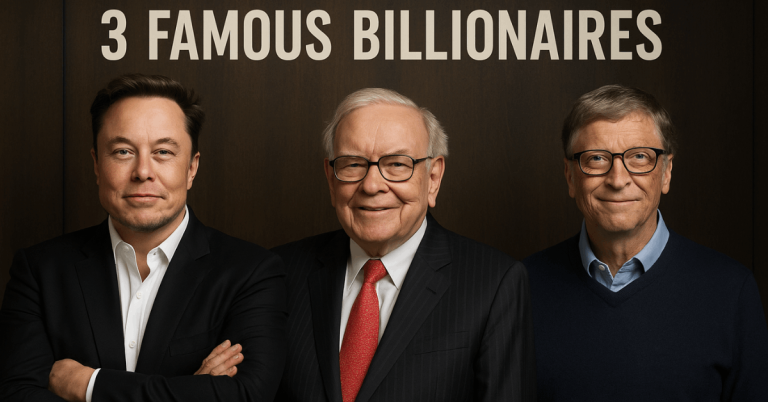Not every millionaire followed a traditional path to success. Some built their fortune through the most unusual ways millionaires got rich, such as virtual land, trash recycling, and novelty products.
This article highlights those stories with useful lessons. They show that wealth can come from bold, strange, or overlooked ideas.
The Top 3 Paths Millionaires Took in Unusual Ways
These three examples show how unconventional thinking led to significant wealth. Each one highlights a method that defies traditional expectations and reveals hidden opportunity.

1. Selling Virtual Real Estate in Online Games
Some millionaires made their fortune by buying and selling digital land. This unique path involves turning virtual assets into real-world profits.
How the Digital Real Estate Market Works?
Virtual worlds like Second Life, Decentraland, and Entropia Universe allow users to buy land using real currency. These digital plots can be developed and resold for profit.
Ailin Graef, known as Anshe Chung, earned over $1 million from such transactions. Virtual properties increase in value based on scarcity, user activity, and branding potential.
Businesses can lease land or place ads within these spaces. This creates income streams that mirror real estate models.
Key Factors That Drove Profit
The people who succeeded entered these platforms early. Scarcity of land and user engagement fueled prices.
Monetization options like renting, advertising, and event hosting created value. Technical knowledge was useful, but creativity mattered more.
These investors understood digital culture and online behavior. Timing and adaptability led to their financial wins.
Lessons for Modern Entrepreneurs
Digital assets can yield real value if used strategically. Investing in new tech platforms offers early-mover advantages.
Even simple spaces can become profitable with creative use. Keep an eye on trends in gaming, Web3, and virtual events.
Understand the community before investing. Success depends on timing, experimentation, and persistence.
2. Building a Fortune from Trash
Some millionaires earned their wealth by turning waste into profitable goods. This path is grounded in identifying overlooked materials and recycling them smartly.
Types of Trash That Built Wealth
People collected and resold scrap metal, aluminum cans, and broken electronics. Others used cooking oil to sell to biodiesel companies.
These ventures began with low capital but scaled through consistency. Understanding resale markets was crucial to growth.
Entrepreneurs also found opportunities in collecting paper, plastics, and old appliances. Each item had hidden monetary value.
Global Examples of Recycling Millionaires
In developing countries, the e-waste trade flourished. Entrepreneurs dismantled discarded electronics to extract valuable metals.
Items like gold, copper, and rare earths were resold for profit. These manual operations built sustainable businesses over time.
Their work was labor-intensive but highly lucrative. It showed that even trash could lead to serious income.
Business Lessons from Trash-Based Wealth
The key is recognizing neglected resources. Entrepreneurs proved that wealth doesn’t require luxury tools.
A trash bag, effort, and insight were enough to get started. Many began with no formal training or funding.
They saw what others ignored and took action. Their stories show that wealth can come from anywhere.
3. Creating and Selling Bizarre or Niche Products
This wealth-building method involves launching strange or niche items that capture public attention. These products often go viral due to their novelty, humor, or uniqueness.
Millionaires Behind Odd Products
Ken Hakuta earned over $80 million from the Wacky WallWalker, a sticky toy that became a sensation. In the 1970s, Gary Dahl launched the Pet Rock, a simple idea that turned into a pop culture hit.
These products succeeded because they sparked curiosity and amusement. They were low-cost to make but high in market appeal.
Their success wasn’t based on utility but on novelty and timing. These stories show how silliness can become serious profit.
Types of Unusual Products That Succeeded
Many unusual products that led to wealth were strange, funny, or creatively absurd. Below are some of the most successful examples that found viral success.
- Fake mustaches became popular novelty gifts and party props. Their simplicity and humor made them appealing to a wide audience.
- Poop emoji pillows capitalized on internet culture and visual trends. Their absurdity and humor made them ideal for gifts and social media posts.
- Themed board games focused on niche topics or satire. They attracted buyers looking for personalized or unconventional entertainment.
- Joke gift items such as canned air or screaming goat toys gained popularity for their uniqueness. These products relied on impulse buys and laughter.
- Internet meme merchandise turned viral jokes into wearable or usable goods. Shirts, mugs, and stickers tied to popular memes sold quickly online.
- Pet Rock-style novelties showed that low-cost, simple ideas with strong branding could go far. These quirky items thrive on curiosity and nostalgia.
Tips to Replicate Their Strategy
Many successful entrepreneurs used simple but intentional actions to turn their ideas into profitable businesses. Follow these practical tips to test and launch your unusual product idea:
- Watch trends on platforms like TikTok, Reddit, or Instagram to spot what grabs attention early.
- Look for emotional reactions—ideas that make people laugh or share are more likely to spread.
- Test your product using small batches to reduce risk and gauge demand.
- Sell directly online through platforms like Etsy, Shopify, or Amazon Handmade.
- Use creative marketing to tell a fun story, build curiosity, or entertain.
- Stay bold and persistent—if it’s weird but working, don’t stop until you scale it.
Common Traits Behind These Unusual Successes
Despite the unusual methods, these millionaires share certain traits. Learning about them can help you recognize similar opportunities.

- Timing: Most of these entrepreneurs acted early. They entered markets before they were crowded.
- Creativity: They didn’t follow traditional paths. Instead, they created new ones by thinking differently.
- Low Startup Costs: Many of these ventures required little capital. Some began with free or recycled materials.
- Marketing: Their success often relied on storytelling, uniqueness, and going viral.
- Persistence: These people kept going despite initial skepticism from others.
If you share any of these traits, it might be time to explore unconventional income streams. New platforms and technologies continue to open fresh paths to wealth.
What You Can Learn From These Millionaires?
You don’t need to follow the usual rules to succeed. These millionaires prove that thinking differently can lead to real money.
Observe Emerging Trends
Start by watching for new platforms and unusual patterns in consumer behavior. Pay attention to ideas others ignore or mock.
Often, these concepts grow into mainstream markets. Many top earners moved fast when trends were still underground.
Platforms like TikTok or niche gaming spaces reveal untapped potential. Spotting early signs gives you a competitive edge.
Take Smart and Fast Action
Once you find an idea with promise, move quickly. Early adopters usually benefit the most. Don’t wait for others to approve or follow.
Test your idea in a low-risk way to gauge response. Speed matters more than perfection. Fast action can lead to big advantages.
Embrace Unconventional Thinking
Weird ideas often succeed because they’re different. Don’t be afraid to try something new, even if it seems strange.
The market rewards uniqueness and boldness. Build a product or service around what gets attention.
Focus on emotional reactions, curiosity, or humor. Your odd idea might become your greatest asset.
Final Thoughts: The Riches Hidden in the Unexpected
The unusual ways millionaires got rich often challenge common ideas about success. From digital land to trash recycling, the road to wealth is rarely traditional.
Many of these paths don’t involve the corporate ladder at all. If you explore where others don’t look, you might uncover unexpected fortune.





